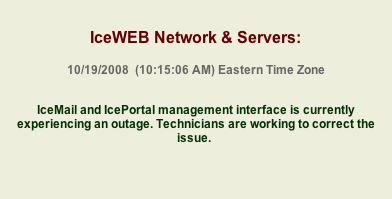While there is much chatter flying around about the current fiscal crisis, and the Wall Street “bailout” along with near-constant references to this being the worst financial crisis since the Great Depression, which is likely true, history is replete with examples of how fiscal crises have it the United States numerous times in the past and that they are liking to keep happening in the future regardless of any action taken on the part of politicians and policymakers.
Our economic model operates in a cyclical manner going from boom to bust to boom and back to bust; the model repeats itself over and over without end. Much of this likely attributed to our (expansive) monetary policies, the growing national debt and extremely lax regulations on the banking industry.
The fact that a bunch of greedy cooked up the sub-prime mortgage mess certainly didn’t do anything to help the situation along, but much of this opportunistic behavior was driven by the free-market policies set up by the United States Government, many of which came into existence as far back as thirty years ago during the Carter Administration.
For evidence that financial crises have visited us in the past and are likely to do so in the future, one needs to look no further than the Wikipedia article on “Panic of 1819”. This article reports that the first major financial crisis in the United States occurred in 1819 directly after the depression of the late 1780s. This depression likely lead to the creation of the dollar and somewhat indirectly a call for a Constitutional Convention. Remember that in the early years of the union, states used their own currencies each with their own values and exchange rates; this made doing business very difficult from a money conversion standpoint – not a strong point for the economy.
Most economists adhere to the mainstream theory that the Panic of 1819 was the early Republic’s first experience with the boom-bust cycles common to all modern economies. This was the first failure of the market economy in America, and there were broader institutionally-based causes for the events of 1819 and the early 1820s. This was likely the first failure of expansionary monetary policy, in which government borrowed heavily to finance the War of 1812 (sound familiar?), which caused tremendous strain on the banks’ reserves of specie (Money, especially in the form of coins made from precious metal, that has an intrinsic value; coinage), and led inevitably to suspension of specie payments in 1814 during war & again in 1819-1821during recession. Expansionary policy can be implemented by increasing the size of the monetary base. This directly increases the total amount of money circulating in the economy. In the United States, the Federal Reserve can use open market operations to increase the monetary base. The Federal Reserve would buy bonds in exchange for hard currency. When the Federal Reserve disburses this hard currency payment, it adds that amount of currency to the money supply, thus increasing the monetary base
This spurred the establishment on new banks and the expansion of bank note issues. The inflation of money encouraged unsustainable investments to take place. This was soon realized as bad, leading to the establishment of the Second Bank of the United States, which forced a halt to the expansion and a launch of the painful process of contraction. A wave of bankruptcies, bank failures and bank runs ensued; prices dropped and wide-scale urban unemployment began. By 1819 many Americans did not have enough money to pay off their loans.
The impact was international, with Britain engaged in war with France, and disruptions of foodstuff and precious metals from Mexico and Peru.


















You must be logged in to post a comment.